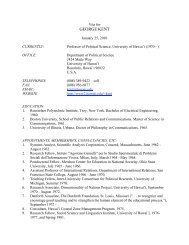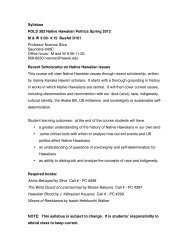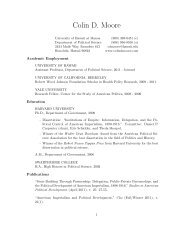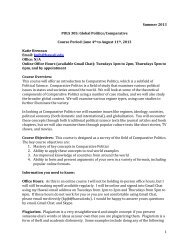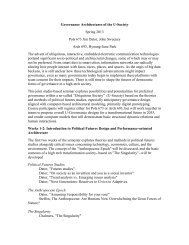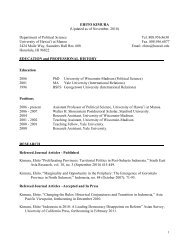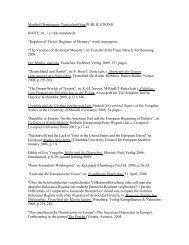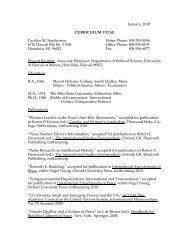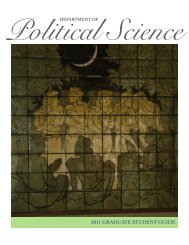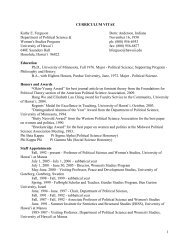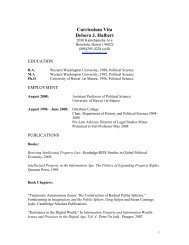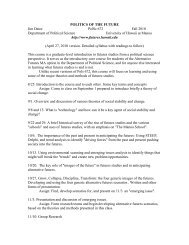Fall 2012 POLS 620 Syllabus [PDF] - Department of Political Science
Fall 2012 POLS 620 Syllabus [PDF] - Department of Political Science
Fall 2012 POLS 620 Syllabus [PDF] - Department of Political Science
You also want an ePaper? Increase the reach of your titles
YUMPU automatically turns print PDFs into web optimized ePapers that Google loves.
Pr<strong>of</strong>essor: Dr. Noelani Goodyear-Kaʻōpua Office: Saunders 609<br />
E-mail: goodyear@hawaii.edu<br />
Office Hours: Thurs 12:30 – 2:30pm<br />
In this assignment, I want you to write or speak a letter (or some other form such as a mele, poem,<br />
personal narrative) to a specific person who is not located within academe. Take some <strong>of</strong> the central<br />
insights you are learning and share them with this person. Start a dialogue. Make some observations.<br />
Engage this person in your process, and push yourself to integrate emotion and analysis. Whether or not<br />
you actually share this piece with your intended audience is up to you. If you are looking for inspiration,<br />
check out James Baldwin’s “My dungeon shook: Letter to my nephew on the 100 th anniversary <strong>of</strong> the<br />
emancipation.”<br />
4. A mapping <strong>of</strong> major ideas, arguments, texts and authors. AND oral defense.<br />
Due date: Dec 14<br />
The final assignment is intended to help you synthesize what you have learned in this introduction to<br />
Indigenous Politics. We have talked about the formation <strong>of</strong> Indigenous Studies in terms <strong>of</strong> various<br />
genealogies, so think about this assignment as an opportunity to map the relationships between texts,<br />
ideas, social movements, authors and/or places. Your map can take the form <strong>of</strong> a diagram with text, a<br />
conventional annotated bibliography or literature review, a collection <strong>of</strong> images related to the works we<br />
read (with captions), a series <strong>of</strong> blog postings in a public forum, or a mele with an explanatory essay.<br />
Whatever form you decide to use, you should include at least 10 <strong>of</strong> the texts we have engaged this<br />
semester which have been most influential to you. Most importantly, the process and product should be<br />
useful to you (and others) in the long run. You will present and defend your map during the final meeting<br />
<strong>of</strong> our class.<br />
5. A final self-assessment <strong>of</strong> your performance and achievements in the course<br />
Due date: Dec 14<br />
The self-assessment must include the letter grade you recommend for your performance in the course. It<br />
should then substantiate that recommendation by describing what you’ve put forth and what you’ve<br />
gained from the class. You will have a separate opportunity to evaluate the course and me, so keep this<br />
focused on you and your performance. The self-assessment should be the cover page <strong>of</strong> your portfolio<br />
and should be followed by all the pieces listed above (#1-4).<br />
Policies<br />
Late Work: Late work is unacceptable. If extraordinary circumstances arise, I will consider exceptions<br />
on a case-by-case basis. There will be a grade penalty <strong>of</strong> some kind, if the work is accepted at all.<br />
Academic Integrity: It is the studentʻs responsibility to be aware <strong>of</strong> and in compliance with the<br />
university’s policies regarding academic dishonesty. (See the UH catalog, link:<br />
http://www.catalog.hawaii.edu/about-uh/campus-policies1.htm). Furthermore, cheating and stealing are<br />
not acceptable within a Hawaiian cultural value system. Any academic dishonesty—such as plagiarism—<br />
will result in failure <strong>of</strong> the course. Plagiarism is taking another person’s words or ideas without<br />
crediting them. Anything cut and pasted from a website without quotation marks and proper citation is<br />
plagiarism. Copying anything from a book or journal without quotation marks and proper citation is<br />
plagiarism. Plagiarism is academic theft, and there is no excuse for it. A student who submits a paper<br />
with plagiarized parts will receive an ʻFʻ for the course, no discussion.<br />
Plagiarism usually occurs when students feel overwhelmed—by school, by finances, by illness,<br />
relationship problems, etc. If you are dealing with a situation like this, please let me know and we can<br />
work something out that will be much more positive than cheating. If you are unsure about how to<br />
properly use and credit sources, ask me for advice. You can also consult any <strong>of</strong> the numerous online<br />
sources that provide tips on academic writing. See me if you need suggestions.<br />
Reasonable Accommodation Policy: If you feel you need reasonable accommodations because <strong>of</strong> the<br />
impact <strong>of</strong> a disability, please 1) contact the KOKUA Program (V/T) at 956-7511 or 956-7612 in room<br />
013 <strong>of</strong> QLCSS; 2) speak with me privately to discuss your specific needs. I will be happy to work with<br />
you and the KOKUA Program to meet your access needs.<br />
4


![Fall 2012 POLS 620 Syllabus [PDF] - Department of Political Science](https://img.yumpu.com/25416938/4/500x640/fall-2012-pols-620-syllabus-pdf-department-of-political-science.jpg)
